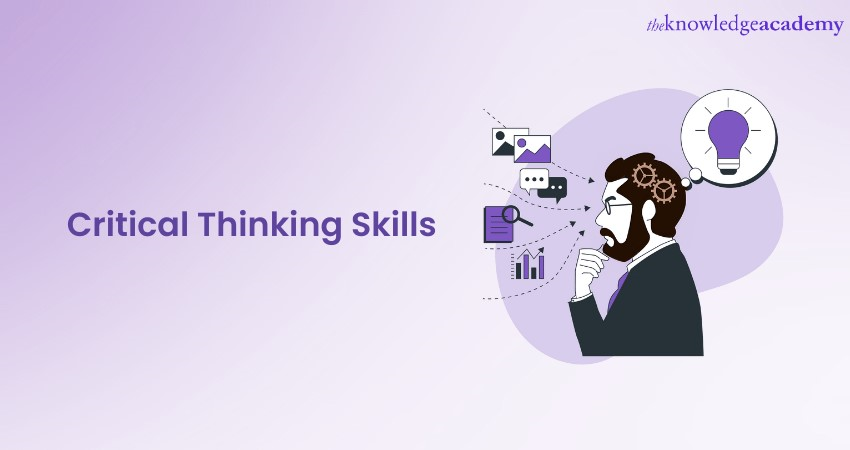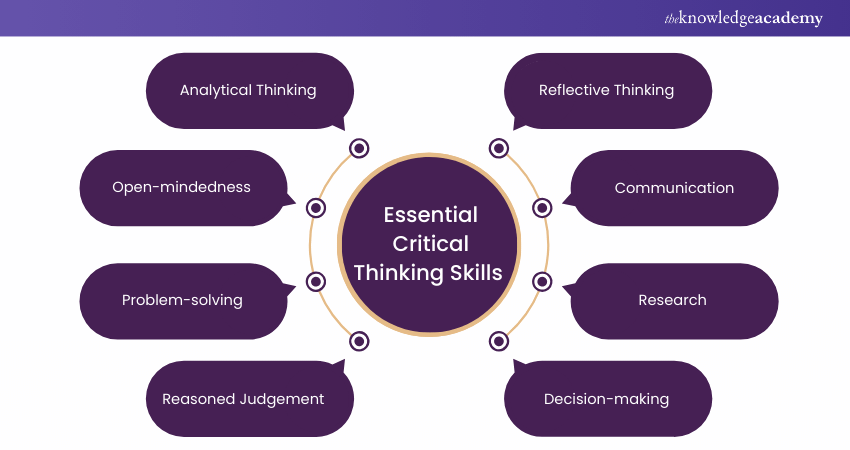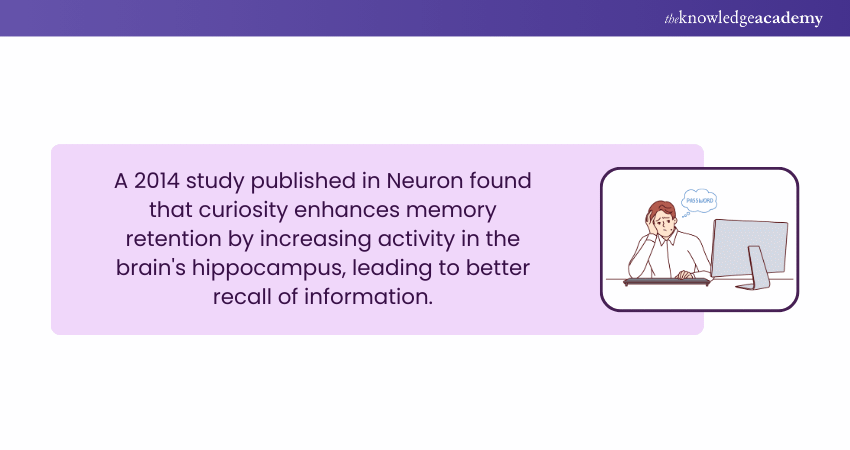We may not have the course you’re looking for. If you enquire or give us a call on +60 1800812339 and speak to our training experts, we may still be able to help with your training requirements.
Training Outcomes Within Your Budget!
We ensure quality, budget-alignment, and timely delivery by our expert instructors.

Have you ever found yourself needing to make a tough decision, solve a challenging problem, or navigate conflicting information? In moments like these, Critical Thinking Skills become your most valuable asset. They enable you to analyse complex issues, challenge assumptions, and make informed decisions, ensuring success in both personal and professional life.
This blog explores the meaning, types, and real-world applications of Critical Thinking Skills. We will also discuss the practical steps to enhance your decision-making skills. Ready to strengthen your thinking and overcome challenges with confidence? Let’s dive in!
Table of Contents
1) What is Critical Thinking?
2) Essential Critical Thinking Skills
a) Analytical Thinking
b) Open-mindedness
c) Problem-solving
d) Reasoned Judgement
e) Reflective Thinking
f) Communication
g) Research
h) Decision-making
3) How to Develop Critical Thinking Skills?
4) Conclusion
What is Critical Thinking?
Critical Thinking is the ability to analyse information objectively and make a reasoned judgment. It includes evaluating sources, such as data, facts, observable phenomena, and research findings, to form a well-supported conclusion. Here are some of the key aspects of Critical Thinking:
1) Analysis: Breaking down complex information into smaller, understandable parts.
2) Evaluation: Determining the credibility and relevance of information sources.
3) Inference: Drawing reasonable conclusions from the available evidence.
4) Explanation: Clearly and concisely explain your reasoning and conclusions.
5) Self-regulation: Reflecting on your own beliefs, values, and biases to ensure they do not cloud your judgment.
Essential Critical Thinking Skills
Critical Thinking is important for success in everyday life, education, and professional settings. Here are eight key Critical Thinking Skills to develop:

1) Analytical Thinking
Analytical Thinking entails evaluating information from diverse sources to draw well-founded conclusions. It helps individuals overcome cognitive biases and manage complex issues effectively. Analytical thinkers excel at:
a) Identifying patterns and trends
b) Breaking down intricate problems into manageable parts
c) Recognising cause-and-effect relationships
d) Assessing the validity of arguments and evidence
Example: A Data Analyst interprets sales figures to identify patterns that guide marketing strategies.
2) Open-mindedness
Open-mindedness is the readiness to consider new ideas, arguments, and perspectives without prejudice. It encourages unbiased analysis and decision-making by acknowledging multiple viewpoints. Key traits include:
a) Willingness to explore alternative ideas
b) Suspending judgment until evidence is evaluated
c) Accepting constructive feedback
d) Flexibility to revise beliefs based on new information
Example: A Team Leader welcomes unconventional suggestions during a product development meeting, resulting in an innovative solution.
3) Problem-solving
Problem-solving is integral to Critical Thinking, enabling individuals to identify issues, generate solutions, and implement effective strategies. This skill is particularly valuable in management and entrepreneurship. Steps include:
a) Clearly defining the problem
b) Gathering relevant information
c) Brainstorming and evaluating solutions
d) Selecting and implementing the best option
e) Reviewing outcomes to refine future approaches
Example: A school principal addresses low student engagement by consulting experts, surveying students, and introducing a balanced, real-world-focused curriculum.
4) Reasoned Judgement
Reasoned judgment includes making thoughtful decisions based on logical analysis and careful consideration of alternatives. It requires:
a) Objectively evaluating evidence and arguments
b) Assessing the credibility and relevance of information
c) Considering diverse perspectives
d) Drawing conclusions through logical reasoning
Example: A science teacher designs an experiment, analyses results methodically, and forms evidence-based conclusions.
5) Reflective Thinking
Reflective Thinking is the process of evaluating one’s own thoughts, actions, and decisions to learn and improve. It fosters continuous development and better problem-solving. Reflective thinkers:
a) Critique personal assumptions and biases
b) Integrate insights from diverse experiences
c) Apply lessons to enhance future actions
d) Continuously refine their thought processes
Example: A community organiser evaluates a recent public event. They identify areas of success and opportunities for improvement.
6) Communication
Effective Communication is important for articulating ideas clearly and persuasively. It supports teamwork, leadership, and knowledge-sharing. Strong communicators:
a) Convey complex ideas with clarity
b) Actively listen and comprehend diverse viewpoints
c) Tailor their style to suit different audiences
d) Construct persuasive arguments
Example: A manager introduces a new policy to her team, addressing concerns and ensuring clarity about its implications.
7) Research
Research Skills enable critical thinkers to gather, assess, and synthesise information from credible sources. This is essential in academic and professional fields requiring ongoing learning. Key aspects include:
a) Identifying trustworthy and relevant sources
b) Evaluating bias and reliability
c) Synthesising findings into coherent conclusions
d) Recognising knowledge gaps
Example: A journalist cross-checks information from multiple credible sources before reporting on a controversial issue.
8) Decision-making
Decision-making is the culmination of Critical Thinking Skills involving logical reasoning, risk assessment, and choosing the best course of action. Key elements include:
a) Defining criteria for evaluation
b) Considering short-term and long-term outcomes
c) Balancing logic with intuition
d) Managing uncertainty and risk
Example: A homeowner weighs costs, benefits, and future implications before investing in solar panels.
Learn how to enhance your well-being with our Stress Management Training. Join now!
How to Develop Critical Thinking Skills?
Improving Critical Thinking Skills involves a combination of practice, reflection, and learning. Here are some effective strategies to help you enhance your Critical Thinking skills:
1) Ask Questions

a) Be Curious: Always ask "why," "how," and "what if" to deepen your understanding of a topic.
b) Seek Clarification: Don’t hesitate to ask for more information or explanations when something is unclear.
2) Gather Information
a) Research Thoroughly: Collect data from multiple reliable sources before forming an opinion.
b) Evaluate Sources: Evaluate the reliability and applicability of the information you gather.
3) Analyse Assumptions
a) Identify Biases: Reflect on your own biases and assumptions that might affect your judgment.
b) Challenge Preconceptions: Be open to new ideas and willing to change your mind when presented with new evidence.
4) Consider Different Perspectives
a) Engage in Discussions: Talk with people who have different viewpoints to broaden your understanding.
b) Read Widely: Explore diverse subjects and viewpoints to expand your knowledge base.
5) Reflect on Your Thinking Process
a) Self-assessment: Regularly evaluate your thought processes and decisions to identify areas for improvement.
b) Learn from Mistakes: Analyse past mistakes to understand what went wrong and how to avoid identical errors in the future.
6) Practice Problem-solving
a) Work on Puzzles: Engage in activities like puzzles, brainteasers, and strategy games to sharpen your analytical skills.
b) Apply Critical Thinking: Use Critical Thinking in everyday situations, such as planning a project or making a significant decision.
7) Communicate Effectively
a) Explain Your Reasoning: Practice articulating your thought process clearly and logically.
b) Listen Actively: Pay attention to others’ arguments and consider their points before responding.
Elevate your listening skills to improve relationships- start learning with us. Register for Active Listening Training now!
Conclusion
Critical Thinking Skills are important for overcoming complex challenges and making informed decisions in personal and professional life. Analysing information, evaluating evidence, and considering multiple perspectives can help enhance problem-solving skills and achieve success. Start developing these vital skills today to unlock your full potential!
Master your schedule with expert Time Management Training – join today!
Frequently Asked Questions

Highlight your skills to analyse complex problems, evaluate information objectively, and make informed decisions. Share examples of problem-solving, decision-making, or innovative ideas in professional or academic settings.

A critical thinker demonstrates analytical skills, open-mindedness, logical reasoning, and effective problem-solving. They question assumptions, consider diverse perspectives, communicate clearly, and base decisions on evidence rather than emotions or biases.

The Knowledge Academy takes global learning to new heights, offering over 30,000 online courses across 490+ locations in 220 countries. This expansive reach ensures accessibility and convenience for learners worldwide.
Alongside our diverse Online Course Catalogue, encompassing 19 major categories, we go the extra mile by providing a plethora of free educational Online Resources like News updates, Blogs, videos, webinars, and interview questions. Tailoring learning experiences further, professionals can maximise value with customisable Course Bundles of TKA.

The Knowledge Academy’s Knowledge Pass, a prepaid voucher, adds another layer of flexibility, allowing course bookings over a 12-month period. Join us on a journey where education knows no bounds.

The Knowledge Academy offers various Personal Development Courses, including Time Management Training, Supervisor Training, Active Listening Training and Stress Management Course. These courses cater to different skill levels, providing comprehensive insights into Emotional Awareness.
Our Business Skills Blogs cover a range of topics related to Critical Thinking, offering valuable resources, best practices, and industry insights. Whether you are a beginner or looking to advance your Business skills, The Knowledge Academy's diverse courses and informative blogs have got you covered.
Upcoming Business Skills Resources Batches & Dates
Date
 Attention Management Training
Attention Management Training
Fri 10th Jan 2025
Fri 28th Feb 2025
Fri 4th Apr 2025
Fri 16th May 2025
Fri 11th Jul 2025
Fri 19th Sep 2025
Fri 21st Nov 2025







 Top Rated Course
Top Rated Course



 If you wish to make any changes to your course, please
If you wish to make any changes to your course, please


